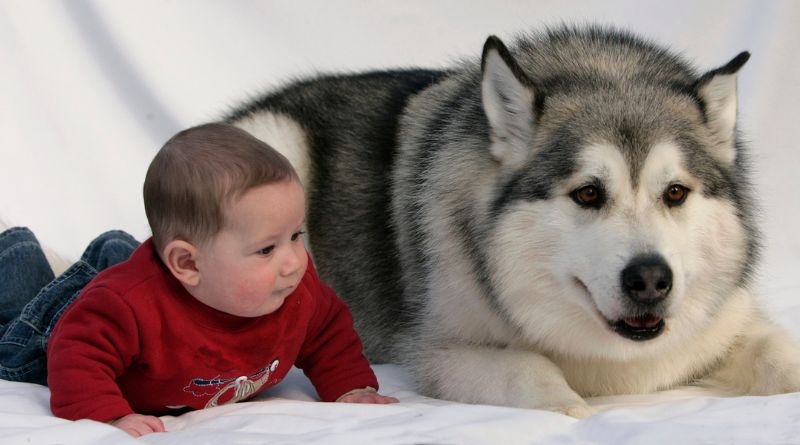There’s something undeniably heartwarming about the bond between babies and dogs. Whether it’s a playful puppy wagging its tail at a newborn or a dog gently nuzzling a toddler, these connections often evoke feelings of joy and affection. In this article, we’ll explore the benefits of having a dog in a family with a baby, how to nurture this bond, and answer common questions about babies and dogs living harmoniously together.
Table of Contents
The Connection Between Babies and Dogs
- Emotional Bonding and Comfort
Dogs are known for their loyalty and affectionate nature. For babies, being around dogs can provide a sense of comfort and emotional security. The rhythmic sound of a dog’s bark, the warmth of its presence, or simply seeing it interact with family members can help babies feel calm and safe. - Learning Empathy
As babies grow, they begin to learn empathy, and interacting with dogs is one of the best ways to foster these emotions. Babies who grow up with dogs often develop a deeper sense of compassion and an understanding of others’ feelings. They learn to recognize non-verbal cues, such as a dog’s body language, helping them understand emotions at an early age. - Physical and Mental Stimulation
Having a dog around a baby can provide both mental and physical stimulation. Babies are naturally curious, and they may love to watch the dog’s movements or even engage in simple games. As they grow, they may begin to crawl, walk, and play with the dog, promoting physical development.
Benefits of Babies Growing Up with Dogs
- Stronger Immune System
Studies have shown that children who grow up in homes with dogs are less likely to develop allergies and asthma. The exposure to dogs and their environment can help strengthen a child’s immune system, making them less susceptible to infections. - Promotes Active Lifestyle
Dogs need exercise, which can encourage parents and babies to spend time outside, taking walks and exploring the world together. This promotes an active lifestyle for the whole family, benefiting both baby and dog. - Improved Social Skills
Dogs are often great icebreakers, helping babies learn to socialize. As babies grow and start interacting with other people and animals, their exposure to dogs helps them feel more comfortable and confident in social situations.
Tips for Safe and Positive Interactions Between Babies and Dogs
- Supervise Interactions
Always supervise interactions between babies and dogs, especially if the dog is excitable or not used to being around children. Babies should never be left alone with a dog, regardless of how friendly the dog may seem. - Teach Gentle Touch
As babies grow and start exploring the world with their hands, it’s essential to teach them to interact gently with the dog. Show them how to pet the dog calmly rather than pulling on its fur or tail. - Maintain Boundaries
Set clear boundaries for both your baby and your dog. Make sure your dog has a designated space where it can retreat to if it feels overwhelmed, and teach your baby to respect that space. - Socialize the Dog
Before introducing a baby to a dog, ensure the dog is well-socialized and comfortable around children. If the dog is not used to babies, you may want to consult with a professional dog trainer to help with the adjustment.
FAQs About Babies and Dogs
Q1: Is it safe for a newborn to be around a dog?
Yes, it is safe for a newborn to be around a dog, but you should always supervise their interactions. Ensure that your dog is well-behaved and accustomed to being around babies. Maintain cleanliness and good hygiene practices, especially when the dog has been outdoors.
Q2: Can dogs help babies with emotional development?
Absolutely! Dogs provide emotional support and companionship, which can help babies develop emotional intelligence. Their presence can offer comfort, reduce anxiety, and provide a calming influence on babies.
Q3: How can I prepare my dog for a new baby?
If you’re expecting a baby, begin preparing your dog early by gradually introducing baby-related items (like strollers, cribs, and baby sounds) and allowing your dog to get used to the new environment. Consistency in training and ensuring the dog’s routine remains relatively unchanged will also help the dog adjust to the arrival of a new family member.
Q4: What are the best breeds for families with babies?
While every dog is unique, some breeds tend to be more patient and gentle around children. Breeds like Golden Retrievers, Labradors, Beagles, and Collies are often considered good family dogs because of their friendly nature and ability to bond with children.
Q5: Can a dog’s behavior change around a baby?
Yes, a dog’s behavior can change when a baby arrives. Some dogs may become more protective or sensitive, while others may become more curious. It’s important to monitor your dog’s behavior and ensure they receive enough attention and training as the baby grows.
Conclusion
The bond between a baby and a dog is one of life’s most heartwarming relationships. Not only do dogs provide comfort, companionship, and emotional support, but they also teach valuable lessons about empathy and kindness. By following safety guidelines and nurturing the relationship, families can enjoy a harmonious and enriching experience as both babies and dogs grow together.



